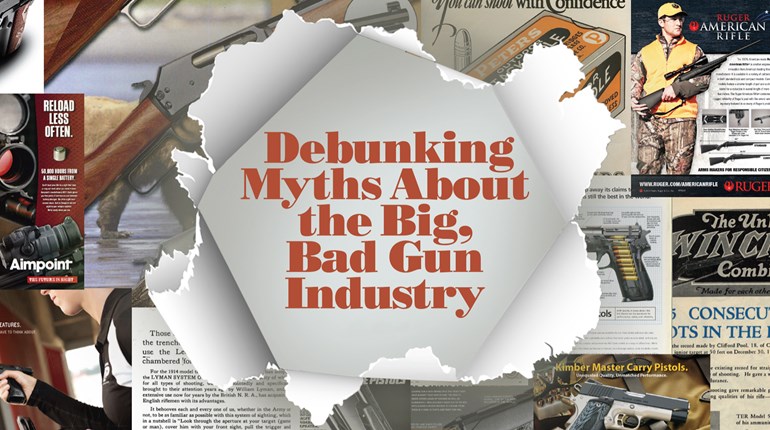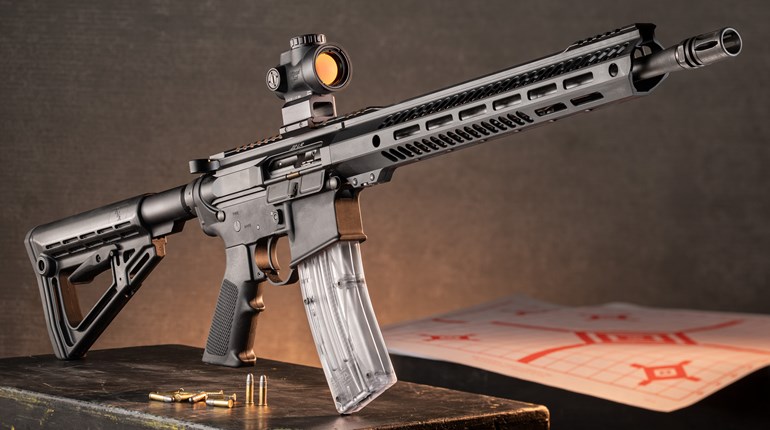
Some banks have embarked on a business path to enact policies to restrict gun sales and exert pressure on the firearms industry. Two of the banks grabbing headlines for anti-gun policies are Citibank and Bank of America.
In present-day American culture, exposing inconsistent, deviant, fraudulent, immoral, shocking and even illegal actions of politicians, celebrities, media and businesses often isn’t enough.
We’re seeing this now in the financial industry where access to an open marketplace is being denied for no other reason than connections to or interest in firearms. Banking is an industry that has flourished and grown thanks to protections and bailouts from us. When discriminatory behavior has blocked free access to certain groups, Congress, state legislatures and the courts have acted forcefully in the past to clear the barriers.
Citi refuses to do business with any gun vendor that sells guns to customers under age 21—even though federal law allows long-gun sales to individuals who are at least 18 years of age and who are not otherwise prohibited from owning a gun.
But not now, despite reporting by this magazine and others in the media, discrimination against lawful firearm owners, dealers and manufacturers is being allowed to stand, and, in fact, appears to be picking up steam. That’s certainly the case as two of the nation’s biggest banks—Citibank and Bank of America—have embarked on a business path to enact policies seeking to restrict gun sales and exert pressure on the firearm industry.
Citibank, owned by Citigroup in New York, has issued a new policy called the “U.S. Commercial Firearms Policy.” Citi refuses to do business with any gun vendor that sells guns to customers under age 21—even though federal law and the majority of states allow long-gun sales to individuals who are at least 18 years of age and who are not otherwise prohibited from owning a gun. Citibank’s “rule” applies to gun manufacturers and retailers, and the parent company also stated it will cease doing business with firms that sell standard-capacity ammunition magazines that exceed their arbitrary capacity limit.
“This policy will apply across the firm, including to small business, commercial and institutional clients, as well as to credit-card partners, whether co-brand or private label,” Executive Vice President Ed Skyler said, in a statement on the company website. The site also noted that, “…our new policy centers around current firearms sales best practices that will guide those we do business with as a firm.”
Beyond the obvious question of how a bank has any expertise in “firearms sales best practices,” even more troubling aspects to the policy were soon expressed in posts by customers who vowed to end their financial support. Under Skyler’s blog—titled “Announcing Our U.S. Commercial Firearms Policy”—customers wrote:
“A craven and shameful attempt to curry favor from Citi’s political masters. Every American who values liberty and our Constitution should refrain from doing business with this company. I certainly will.”
“I cancelled my Costco Citi Visa card upon learning of this policy, and informed Costco of the reason for my decision. If Citi wants to institute practices related to policies to improve the human condition, I suggest it start by looking inwardly at its credit policies and its practices that contributed to the great recession and its own insolvency. I also ask Citi officers and board members to consider its policies in view of the fact that 18-year-old citizens are sent, at times compelled, to serve in the military with automatic military firearms for benefit of all citizens, including Citi officers and board members, but Citi believes that 18- to 20-year-old citizens should not be permitted to purchase a single-shot rifle or shotgun. I believe that a shareholder proposal is warranted to publicize such hypocrisy.”
“I will be cancelling both of my Citi accounts. I called customer service to verify the 2nd Amendment stance and was told to visit the website. I did and will not do anymore purchasing with Citi. They will not infringe on my rights.”
Citi says anyone who doesn’t agree with the policy can take their business elsewhere. “If they opt not to [comply], we will respect their decision and work with them to transition their business away from Citi,” Skyler said. Citi also said it plans to initiate “due diligence conversations” with firearms manufacturers to investigate what products they make and sell, who they sell to and how their products are sold.
Citi said it plans to initiate “due diligence conversations” with firearms manufacturers to investigate what products they make and sell, who they sell to and how their products are sold.
Bank of America (BOA) said it refuses to “underwrite or finance military-style firearms” and has dropped a number of gun manufacturers as clients. Firearm manufacturers penalized by BOA include those who produce common variations of the most popular semi-automatics used by law-abiding Americans. Bank of America CEO Brian Moynihan said the decision was made at the request of “teammates” and that the bank will cease business with any firearm manufacturer that does not “modify their practices.”
According to the NRA Institute for Legislative Action: “Those banks [Citigroup and BOA] chose to cave in to anti-gun extremists and establish policies that sought to force their customers in the firearm industry to change their practices, or lose access to financial services.”
JPMorgan Chase continues to lend to firearm manufacturers and retailers, but that may change. Its CEO Jamie Dimon said that the bank may “consider” implementing a different policy. “Everything we do with clients goes through a severe process of review, reputational risk, etc. We have a very small relationship with gun manufacturers,” Dimon said. “There are over 100,000 retailers out there who sell guns. Every single one that we do business with we do a thorough review … and if we think they are doing something wrong our risk committee stops doing business with them.”
Banks are not elected bodies; they are conduits of money. Clearly banks enforcing anti-gun rules against law-abiding citizens and businesses feel entitled to use their money as a battering ram to exert pressure onto others. These banks and their CEOs, officers and risk committees feel entitled to place themselves above our Second Amendment rights.
The greatest irony here is that money in banks belongs to citizens—meaning that if citizens disagree with a bank’s political positions, they are free to stop doing business with that bank. And so while one vital freedom (firearm ownership) is being threatened by the banks’ refusals, free enterprise itself can trump their attempts to dictate behavior, since in every commercial transaction, there is an agreement between a merchant and a customer. Thus financial pressure can work both ways.

Unlike Citibank and Bank of America, Wells Fargo has maintained its support of law-abiding gun owners, retailers and manufacturers. Wells Fargo has bravely withstood a storm of political pressure, refusing to discriminate against customers and maintaining its independent and lawful principles. “We just don’t believe it is a good idea for banks to enforce legislation that doesn’t exist,” former Wells Fargo CEO Timothy Sloan noted recently.
Not content to let banks get away with this discriminatory behavior, pro-gun Sens. Kevin Cramer (R-N.D.) and John Kennedy (R-La.) introduced S. 821 (the Freedom Financing Act) to prohibit discrimination against the firearms industry with financial services. The Freedom Financing Act would amend the Federal Reserve Act to forbid such discriminatory practices by banks, credit card companies, credit unions and users of the Automated Clearing House Network that participate in certain federal programs. “Member banks leveraging their power and position to effectively illegalize legal commerce by refusing to do business with certain industries and individuals due to their differing political beliefs from the member bank violates and usurps the people of the United States and the right of their elected representatives to determine public policy,” the bill states.
The current leadership in the House of Representatives seems intent on doing just the opposite. In hearings in March and April before the House Financial Services Committee, anti-gun members of Congress attempted to pressure large banks to impose policies aimed at restricting Americans’ access to firearms that those members cannot achieve through the proper legislative process.
Representative Carolyn Maloney (D-N.Y.) was the first to attempt to use her position on the Financial Services Committee to influence banks’ firearm policies. First, she went after Wells Fargo for not cutting all financial ties with members of the firearm industry. Then, Maloney praised Citigroup and BOA for instituting policies to restrict their customers constitutional freedoms. It’s an odd world indeed where a lawmaker berates private industry for not usurping the authority of the legislature.
Not to be outdone, Rep. Alexandria Ocasio-Cortez (D-N.Y.) proved that she is a quick study when it comes to the extra-legal use of her official position and considerable celebrity to promote political goals that have failed to advance through the lawmaking process. Never one to avoid the media spotlight, Ocasio-Cortez took several national banks to task on Twitter for helping to finance lawful projects or industries that she finds distasteful, including, unsurprisingly, the firearms industry.
Ocasio-Cortez elaborated on what she was hoping to accomplish in statements to Politico. “There’s more than one way to skin a cat, and not everything has to be done through legislation explicitly,” she said. “We can also use the tools that we have here to pressure change in other ways as well.”
That includes the implicit threat of telling regulated entities they are now on the her naughty list for not enacting her agenda.
Fortunately, not everyone on Capitol Hill has adopted the scorched-earth outlook of Reps. Maloney and Ocasio-Cortez. The stark contrast between their actions and Sens. Cramer and Kennedy is a strong reminder for gun owners that elections have consequences.


































